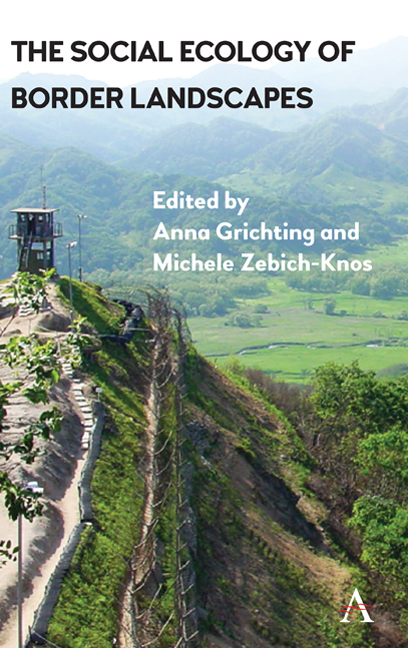Book contents
- Frontmatter
- Contents
- List of Illustrations
- Preface
- List of Contributors
- Introduction: Social Ecologies and Borderlands
- Part I FRAMES: MAPPING SOCIAL ECOLOGIES IN BORDER TERRITORIES
- Part II BRIDGES: RESILIENCE, RESTORATION AND RECLAMATION
- Chapter Four Borders as Zones of Experiential Learning: The Case of the Balkans Peace Park Project
- Chapter Five Social Ecologies in Borderlands: Crane Habitat Restoration and Sustainable Agriculture Project in the Democratic People's Republic of Korea
- Chapter Six Socio-ecological Transformations in Riparian Zones: The Production of Spaces of Exclusion and the Uneven Development of Resilience in the Sonoran Borderlands
- Chapter Seven From No-Man's Land to Every-Man's Land: Socio-ecological Approaches to Reclaiming Shared Spaces in Border Landscapes, with Examples from Germany and Cyprus
- Part III CORRIDORS: CATALYSTS AND COLLABORATION IN CONFINED SPACES
- Part IV PORTALS: DIALOGUE, EXCEPTION AND RETERRITORIALIZATION
- Conclusion: Making Sense of Social Ecology, Borders and the Environment
- Index
Chapter Seven - From No-Man's Land to Every-Man's Land: Socio-ecological Approaches to Reclaiming Shared Spaces in Border Landscapes, with Examples from Germany and Cyprus
from Part II - BRIDGES: RESILIENCE, RESTORATION AND RECLAMATION
Published online by Cambridge University Press: 10 January 2018
- Frontmatter
- Contents
- List of Illustrations
- Preface
- List of Contributors
- Introduction: Social Ecologies and Borderlands
- Part I FRAMES: MAPPING SOCIAL ECOLOGIES IN BORDER TERRITORIES
- Part II BRIDGES: RESILIENCE, RESTORATION AND RECLAMATION
- Chapter Four Borders as Zones of Experiential Learning: The Case of the Balkans Peace Park Project
- Chapter Five Social Ecologies in Borderlands: Crane Habitat Restoration and Sustainable Agriculture Project in the Democratic People's Republic of Korea
- Chapter Six Socio-ecological Transformations in Riparian Zones: The Production of Spaces of Exclusion and the Uneven Development of Resilience in the Sonoran Borderlands
- Chapter Seven From No-Man's Land to Every-Man's Land: Socio-ecological Approaches to Reclaiming Shared Spaces in Border Landscapes, with Examples from Germany and Cyprus
- Part III CORRIDORS: CATALYSTS AND COLLABORATION IN CONFINED SPACES
- Part IV PORTALS: DIALOGUE, EXCEPTION AND RETERRITORIALIZATION
- Conclusion: Making Sense of Social Ecology, Borders and the Environment
- Index
Summary
At its maximum of defiance, the frontier doubles itself inevitably into two lines, each turned toward the exterior, but which must also protect the interior against the threat not only of the other but also of this intermediary interstitial region, the no man's land, this geographical expression of misunderstanding, of rift, at first a corridor of death, desolation, and barbed wire, but which can sometimes soften and become the very image of the crossing of frontiers when that finally begins to occur.
Introduction
This chapter highlights a shift toward human-centered conservation practices, in which nature conservation benefits from the inclusion and empowerment of human communities instead of their exclusion and marginalization and examines two cases: the Cyprus Buffer Zone and the Berlin Wall. In both cases, nature and landscape have played a role in bridging communities across the divide — in Berlin, communities from both sides of the Wall collaborated to bring the Mauer Park into being, while in Cyprus, biologists collaborated on a biodiversity survey in the Buffer Zone. Ecosystems and landscapes must be seen as coupled social-ecological systems whose ability to respond to stresses and change derives from ecological and social characteristics, as well as from the link between these natural and human components. Additionally, many recent studies and literature examine the importance of nature in physical and psychological recovery through practices of active engagement. Contemporary research in neuroscience also demonstrates the effects of settings on the brain, leading to significant developments in healing approaches enhanced by design and access to nature.
The United Nations Buffer Zone (hereafter referred to as UNBZ) that divides the Mediterranean island of Cyprus is examined and proposed as a future shared social and ecological space for the Cypriot communities — a third space or thirdscape that must risebeyond the polarized sphere of the binary and of bicommunalism to embrace the mosaic of social and ethnic groups that inhabit and produce the landscapes of Cyprus. Creating a shared space also implies a shared process, toward co-creating a landscape for the future coexistence of multiple ecologies and social groups. Addressing the contemporary theme of the spatial redevelopment of a post-military zone, it also refers to other borderlands that are undergoing or have undergone similar transformations — in particular in Germany and Berlin — and that have, as precedents, informed this speculative research.
- Type
- Chapter
- Information
- The Social Ecology of Border Landscapes , pp. 131 - 150Publisher: Anthem PressPrint publication year: 2017

